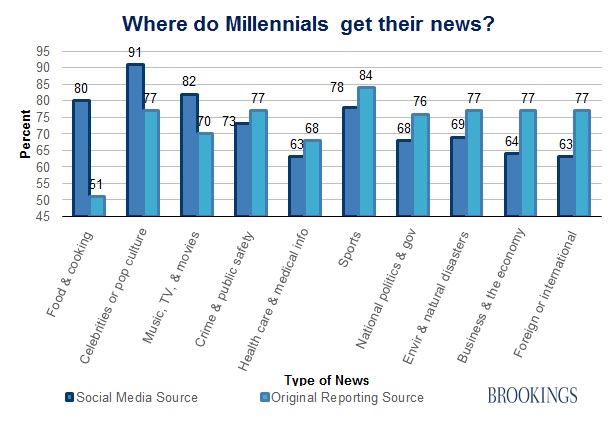Many people believe that America’s first digital generation is “newsless.” Conventional wisdom dictates that one of the many reasons for print newspapers decline is due to low readership rates among Millennials, and that very few of them read the news at all. To complicate the picture further, it’s widely viewed that when Millennials do choose to consume traditional news media, they tend only read sources that confirm their own beliefs. The American Press Institute, collaborating with the Associated Press and AP-NORC Center for Public Affairs Research at the University of Chicago, conducted a large survey to test whether these theories about news consumption were accurate.
Millennials prefer digital news
Millennials prefer to stay connected to the Internet through their mobile devices. 94 percent of Millennials surveyed own smartphones. Contrary to conventional wisdom, news consumption occupies a large portion of young people’s time spent online. 64 percent of the surveyed people report that they regularly keep up with what’s going on in the world. The survey also found that the only activities Millennials reported engaging in more frequently than checking news websites were checking emails and interacting with friends. Among the 64 percent of Millennials who described themselves as “keeping up with what’s going on in the world,” about 70 percent reported engaging in these activities at least once a day and 40 percent did so multiple times a day.

Source: Media Insights Project
Facebook leads the way in social news
Millennials’ consumption of news is different from past generations. Instead of reading the newspaper with breakfast or regularly watching the evening broadcast news, Millennials are more likely to integrate news information into their daily activities. A large portion of Millennials (39 percent) reported actively seeking out news, and 60 percent of those surveyed said they encountered news as a part of their regular activities. Facebook is the main social network where Millennials regularly consume their news. Respondents ranked Facebook as the first or second gateway they used to consume news for a wide variety of topics. Among Millennials who used Facebook to find news, 70 percent say that they will click and read the news stories they encountered. 42 percent regularly post or share news stories with their Facebook friends.
Millennials mostly encounter news through social media, but surprisingly the range of topics they consume is wide-ranging. Millennials consume varied content types with diverse opinions and sources. On average, Millennials regularly follow about 10 different news topics. About half of those topics fit into the “hard news” category, including politics and civil rights issues. Millennials are also exposed to a variety of opinions about those topics. 70 percent of Millennials report that their social media feeds have a good mix of opinions, and 63 percent choose to search for more information about the news they encounter. Although Millennials mainly use social media to learn more about entertainment and lifestyle topics, they still seek out traditional news reporting sources to investigate hard topics such as crime, the economy, and politics.
There is a growing body of evidence showing that the conventional wisdom about Millennials’ consumption of news is wrong. Millennials engage news sources differently than past generations to be sure, but the label is being “newsless” is largely inaccurate.
Yikun Chi contributed to this post
The Brookings Institution is committed to quality, independence, and impact.
We are supported by a diverse array of funders. In line with our values and policies, each Brookings publication represents the sole views of its author(s).




Commentary
The “newsless” myth: How Millennials consume the news
April 16, 2015